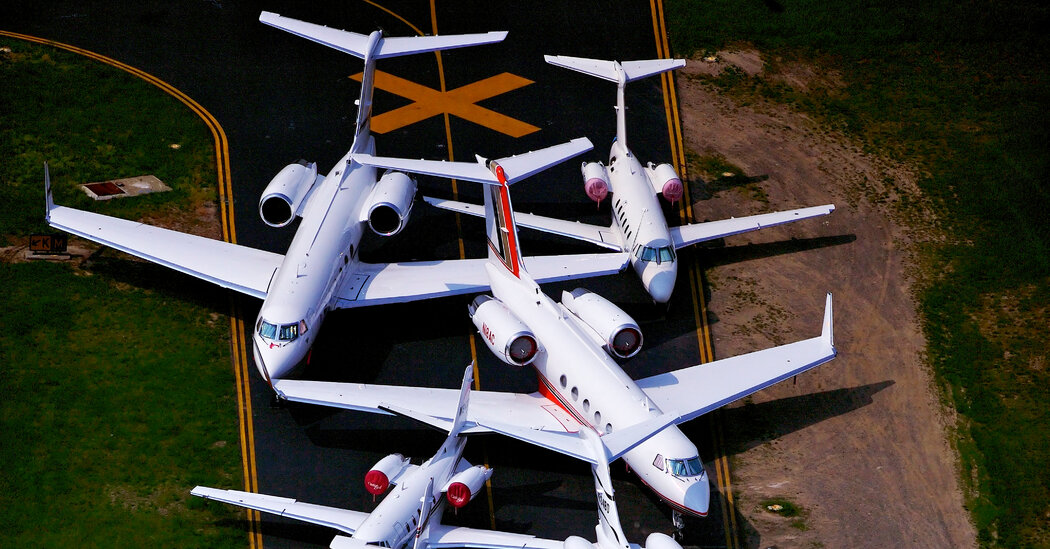Trip after trip, Stephen Prince, a wealthy businessman from St. Simons Island, Georgia, has been taking friends, clients, and colleagues on a hunting excursion to a pheasant preserve situated in northwest Nebraska. Commercial flights on the same route can be exhausting and time-consuming: he would have to sit through at least nine hours of traveling, one or two connecting flights, then a drive to the nearest airport, and more delays in security checks, boarding, and other hassles of commercial air travel.
But Prince, who founded a company in the 90s that has profited from printing gift cards, is a wealthy man who can afford to travel on private planes. He purchased his first private jet a few years ago and is currently using a Cessna Citation 650 that can carry him to his destination in three hours, with a possible stop. Flying private, according to him, is a life-changing experience that spoils him with convenience and luxury. He can comfortably drive up to his plane, get his bags loaded, park his car, and even get served a glass of Scotch or a newspaper.
“You don’t need a spoonful of private aircraft to know what it tastes like – it’s quite remarkable,” Prince says. However, even though he enjoys the luxury, Prince has stopped his high-flying habit. As a progressive activist and vice-chair of an organization of wealthy people, Patriotic Millionaires, he thinks that private flying is unfair and expensive – not for him, but for the rest of us and the planet. The group maintains that rich people flying in private planes should be taxed for the privilege if they must continue to indulge.
Studies published by The Institute for Policy Studies (I.P.S.), and Patriotic Millionaires indicate that private jet users do not pay the cost of maintaining American airports and airspace. Commercial airline passengers in America can be subject to up to a 7.5% tax on domestic ticket prices and $4.50 per segment flown, up to a maximum of $18 for a round trip. They also receive extra costs for flying to Alaska, Hawaii, or international travel. On the other hand, private jets pay only a surcharge tax of about 22 cents per gallon of fuel, leading to private jet flights making up only 2% of the taxes that fund the FAA, even though they handle 16% of all FAA flights.
The study also reveals that the median net worth of full and fractional private jet owners is $190 million and $140 million, respectively. This means that riches individuals who use private jets are being subsidized by commercial airline passengers fliers like you and me.
Passengers flying on private jets also pose a severe threat to the environment, given that they typically carry fewer passengers per trip, and consequently, private jet flights are ten times more carbon-intensive than commercial flights. According to Transport & Environment, a European organization that advocates for zero-emission transportation, private jets use more fuel and are less environmentally friendly than commercial airliners.
While Ed Bolen, the CEO of The National Business Aviation Association, a trade group that represents the private air travel industry, disagrees with several of the I.P.S.’s suggestions, claiming that private planes allow businesses to operate across a broader geographic area than otherwise possible. The N.B.A.A. has also pledged to achieve net-zero carbon emissions by 2050.
For Prince, while he enjoys the convenience brought by flying private, he also admits that it is one of the most selfish things he has ever done. Prince is not alone as private jet travel reached record levels in 2021, with several manufacturers and operators reporting increased demands for their planes.
One factor contributing to the surge in private jet usage is the favorable tax laws that favor private jet owners. The 2017 Tax Cuts and Jobs Act allowed businesses to reduce their taxes by 100% of the cost accrued from purchasing a plane immediately, making owning a private plane seem like a great way to minimize tax bills. Additionally, the law allows wealthy individuals to use their business jets for leisure travel, with the only requirement being that they use the plane primarily for business-related travel.
Flying commercially is already known to be environmentally unsound, and with private jets being even less eco-friendly as they carry few passengers, studies argue that only a few travelers are responsible for the majority of emissions from passenger air transport. Celebjets identified the top flying celebs, including Taylor Swift, whose jet had been in the air for 23,000 minutes – over 16 days – in the first half of 2021, emitting 1,000 times more carbon than an average person in a year. The average person would need to drive up to 15 miles in 20 minutes by car, but Floyd Mayweather took a 10-minute flight between locations, while Kylie Jenner took a 17-minute flight between Southern California suburbs.
The Institute for Policy Studies suggests various ways governments and the private aviation industry can reduce private jet usage, at least for short-haul flights. These include introducing a surcharge for flights below 210 miles, taxing sales of personal planes, and increasing the taxes paid by private jet owners, such as doubling the fuel tax for private jets. Even though billionaires like Elon Musk can afford to pay millions in taxes, introducing these measures would be the first step towards a more equitable transportation system.
As Chuck Collins, the co-author of the I.P.S.-Patriotic Millionaires report, points out, private jets allow affluent individuals to opt-out of the system, meaning they have little incentive to improve it. With the debacle at Southwest Airlines over the past holidays, where 100 billionaires could not make flights due to air traffic difficulties, opting for private jet travel over commercial transport could be a costly luxury that promotes recklessness and damages the environment.














